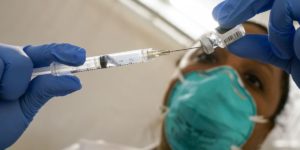
Dr. Marina Del Rios, a doctor from Chicago, says that low vaccinations rates among Latinos is not just due to their hesitancy. She states that in many cases it comes down to questions of logistics and access, “Most people are willing to get vaccinated, they have more questions related to ‘where can I get the vaccine, when will it be my turn, is it going to cost me money?”.
Nationwide, Latino residents have contracted COVID-19 nearly twice the rate of White people and were hospitalized more than four times the rate of White people. According to the data from the U.S. Centers for Disease Control and Prevention just under 12% of those people vaccinated in first month of the rollout were Latinos.
Since March 2020, Latino residents in Chicago have accounted for more confirmed COVID-19 cases than any other group. Equitable distribution of the vaccine was a major concern among health officials in Chicago, who worried that the city’s pharmacy deserts would worsen the inequities of the pandemic’s effect on the city.
Black & Latinos have received a combined of 38% first doses of the vaccine while white residents have received almost 50%. Dr. Del Rios further stated, “If you’re not tied already to a medical home, which is a reality for a lot of Latinos who are undocumented or uninsured, then your chances of getting vaccinated any time soon are slim to none”.
One of the main obstacles that the Latino community must navigate around are limited appointments and hours of the clinics for people who want to get the vaccine but also must work. More appointments in the morning, at night, and throughout the weekend would provide people with more chances to get the vaccine.
As the rollout of the vaccine continues, vaccine distribution sites need to have flexible hours, experts say. Katya Nuques, the executive director of Enlace Chicago, a community organization, stated that 44% of the residents in Little Village Chicago are uninsured and 25% of them are undocumented.
To ensure that everyone receives the vaccine, hospitals must ensure their entire workforce, including the food and maintenance staff, receive all correspondence about signing up to get the vaccine. Dr. Georges Benjamin, executive director of the American Public Health Association, says that the vaccine needs to be administered outside of traditional hours so people who work hourly, frontline jobs don’t have to take off work.
Some researchers say that it is alarming to have disparities so early in the process when most of the people getting vaccinated are health care workers. Dr. Fola May, a health equity researcher at the UCLA Kaiser Permanente Center for Health Equity, said that she would expect health care workers to be the most informed and the least hesitant about science. She also fears that this could be an indication of a bigger racial gap when the vaccine becomes widely available.

Recent Comments